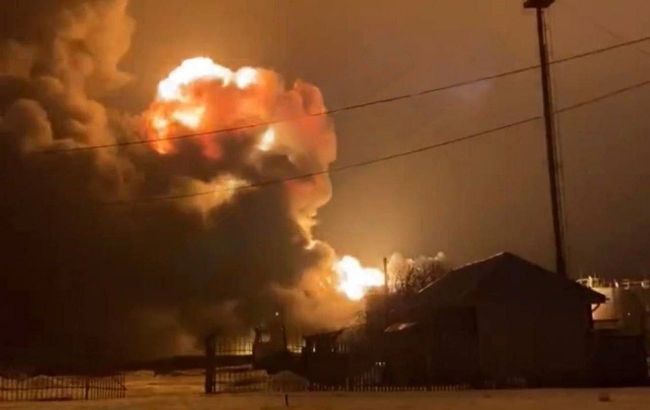Powerful fire broke out at oil depot near Russian city of Kursk
 Photo: a major fire broke out at an oil depot near the Russian city of Kursk (t.me)
Photo: a major fire broke out at an oil depot near the Russian city of Kursk (t.me)
In the Kursk region (Russian Federation), a severe fire occurred at an oil depot overnight on February 15. Local authorities claim it was allegedly an attack by a drone, according to the Governor of the Kursk region, Roman Starovoit, and local public groups.
The information about a significant fire near Kursk around midnight has surfaced online. It was reported that an oil depot reservoir was ablaze.
Initially, the cause of the fire was unknown. Footage of the fire has also been shared on the internet.
Cause of the fire at the oil depot
Later, the governor of the Kursk region made a statement explaining the incident. The Russian official claims that a drone attack occurred in the region, resulting in a fire at the oil depot. He traditionally blames Ukraine for the event.
"As a result of the Ukrainian UAV attack in the Kursk region, a fire broke out at the oil depot," his post reads.
Starovoit also claims that there are no casualties reported so far.
"All special services are currently working at the scene," the official added.
Fires, explosions, and drone attacks in Russia
Earlier, at the end of January, several Russian Telegram channels reported the crash of a drone on the territory of the Nevskiy Mazut oil refinery in St. Petersburg. Russians claimed that although the drone was "successfully shot down," several tanks and cars were still damaged from its fall.
It was also reported that during the UAV attack at the local Pulkovo airport, the Carpet plan was implemented.
Additionally, drone attacks on Russian oil refineries are becoming increasingly systematic. In January, a drone attacked one of the largest oil refineries in Yaroslavl.
Before this, RBC-Ukraine sources reported that SSU drones targeted an oil refinery in Tuapse, resulting in a powerful fire.
We also reported that SSU drones successfully targeted the Ust-Luga Oil oil terminal. They process fuel, including that supplied to the Russian military.
Recently, a fire occurred at the MiG plant in Moscow, which is involved in the comprehensive servicing—from design to repair—of the eponymous Kinzhals carrier-based fighter jets participating in strikes against Ukraine.

